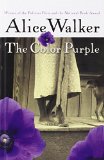

 |

|

The average rating for The Color Purple based on 2 reviews is 5 stars.
Review # 1 was written on 2013-07-21 00:00:00 Peggy S Farrell Peggy S FarrellI give this book 5 stars to spite the myopic David Gilmours and the V.S. Naipauls of the world who think books written by women are irrelevant. I give this 5 stars to make up for the many 1/2/3 star ratings it may receive simply because of Alice Walker's forthright, honest portrayal of unpleasant truths that are often conveniently shoved under the carpet so as not to disturb the carefully preserved but brittle structure of dogma and century-old misconceptions. And I award this 5 stars, symbolically on Banned Books Week as an apology for all the cowardly sentiments of the ones who misuse their power by banning books, thereby shutting out many powerful voices which demand and need to be heard. In my eyes, an author's merit lies not only in their sense of aesthetic beauty, but also in the scope and reach of their worldviews which must reflect in their craft. Alice Walker's is the voice of one such African American writer that recounts a story which not only breaches the boundaries of an issue like emancipation of women but tries to detect a common pattern in problems plaguing civilizations across continents. She gives us one horrifying glimpse after another into the lives of women ravaged by unspeakable brutalities like rape and abuse, lives searching for meaning and connection and seeking out that elusive ray of hope amidst the darkness of despair. And by the end of the narrative, she brings to light with great sensitivity, that misogyny, sexism and blind patriarchal prejudices are as rampantly in vogue in the urban, upscale sphere of American cities as they are in the intractable, untameable African landscapes. Celie and Nettie. Shug Avery, Sofia and Mary Agnes. Tashi and Olivia. All these are but different names and many facets of the same disturbing reality. If the lives of Celie and Nettie are torn apart by sexual abuse and humiliation from childhood, then Tashi and other unnamed young African girls of the Olinka tribe are victims of genital mutilation and other forms of psychological and physical torture. If the men of African American families dehumanize the female members to the point of treating them as mere care-givers and sex slaves, then the objectification of African women by the men of their families is no less appalling. And contrary to accepted beliefs, white families in America are just as easily susceptible to misogyny as the African American families are. But Alice Walker doesn't only stop at opening our eyes to the uncivilized aspects of our so-called civilized world, but also shows us how knowledge of the world and people at large, self-awareness and education can help exorcize such social evils, how it is never too late to gain a fresh perspective, start anew and how empowerment of women eventually empowers society. Dear David Gilmour, if I were a professor of English literature I'd have taught Alice Walker to my students without a shred of hesitation, because here's an author who may not possess the trademark sophistication of Virginia Woolf's lyrical prose but who, nonetheless, fearlessly broaches subjects many masters and mistresses of the craft may balk at dealing with. Alice Walker: 5 | David Gilmour: 0 |
Review # 2 was written on 2011-11-04 00:00:00 Lou Diamond Lou DiamondI read The Colour Purple in my early teens, was traumatized by the graphic abuse portrayed, and vowed to never read it again. I was curious about why so many of my GR friends rated it so highly and was eventually convinced to give it another go. Years after my first read, I still (of course) have the same visceral reaction to the abuse but that no longer blinds me from seeing the magnificence of Alice Walker's storytelling, and how she brings her characters to life. Celie is the protagonist of the tale. Her story is told through a series of letters written firstly to God, and then to her sister Nettie. As an abused, uneducated woman (abused by her father, husband, and step-children) who was only ever shown love by Nettie, the letters are very telling, and are the only means Celie has of expressing her feelings. I adored Celie. It really amazed me how a woman who was abused so much (sexually, physically, verbally) could still have so much love in her heart, and not be bitter. Imagine hearing things like this regularly: (Husband to Celie) - "Who you think you is? You can't curse nobody. Look at you. You black, you pore, you ugly, you a woman. Goddam, he say, you nothing at all." But Celie is something, and one of my favourite parts of this book is the sisterhood portrayed, especially by the enigmatic Shug, who helped Celie on her journey to self-realization. The book has strong female characters, which is another plus. I'm so glad I gave this book a second chance. Celie is a wonderful character and proof of the resilience of the human spirit. "I think us here to wonder, myself. To wonder. To ask. And that in wondering bout the big things and asking bout the big things, you learn about the little ones, almost by accident. But you never know nothing more about the big things than you start out with. The more I wonder, the more I love." |
CAN'T FIND WHAT YOU'RE LOOKING FOR? CLICK HERE!!!